Ph.D. in Medical Physics
General info.
- Faculty working with students: 59
- Students: 51
- Students receiving Financial Aid: 100% of PhD students
- Part time study available: No
- Application terms: Fall
- Application deadlines: November 30
Email: [email protected]
Website: https://medicalphysics.duke.edu

Program Description
The Medical Physics Graduate Program is an interdisciplinary program sponsored by five departments: radiology, radiation oncology, physics, biomedical engineering, and occupational and environmental safety (health physics). Four academic tracks are offered: diagnostic imaging physics, radiation oncology physics, nuclear medicine physics, and health physics. There are currently 51 faculty members associated with the program, and many of these are internationally recognized experts in their fields of study.
The program has available one of the best medical centers in the United States, with outstanding facilities in radiology and radiation oncology for the clinical training elements of the programs. The program has 5,000 square feet of dedicated educational space in the Hock Plaza Building and access to state-of-the-art imaging and radiation therapy equipment in the clinical departments.
Existing equipment and facilities include:
- radiation oncology equipment for 3-D treatment planning, image guided therapy, and intensity modulated radiation therapy;
- radiation protection lab equipment (whole body counter, high resolution germanium gamma detector, liquid scintillation counter);
- dedicated equipment for radiation dosimetry;
- nuclear medicine cameras and scanners in PET and SPECT;
- digital imaging laboratories with dedicated equipment for physics and clinical research in digital radiography and CT;
- the Ravin Advanced Imaging Laboratories;
- the Center for In Vivo Microscopy;
- laboratories for monoclonal antibody imaging and therapy;
- excellent resources for MRI imaging (including a research MR scanner, the Brain Imaging and Analysis Center, and the Center for Advanced Magnetic Resonance Development); and
- ultrasound laboratories in biomedical engineering.
The program is accredited by the Council on Accreditation of Medical Physics Educational Programs (CAMPEP).
- Medical Physics: PhD Admissions and Enrollment Statistics
- Medical Physics: PhD Completion Rate Statistics
- Medical Physics: PhD Time to Degree Statistics
- Medical Physics: PhD Career Outcomes Statistics
Application Information
Application Terms Available: Fall
Application Deadlines: November 30
Graduate School Application Requirements See the Application Instructions page for important details about each Graduate School requirement.
- Transcripts: Unofficial transcripts required with application submission; official transcripts required upon admission
- Letters of Recommendation: 3 Required
- Statement of Purpose: Required (See department guidance below)
- Résumé: Required
- GRE Scores: GRE General (Optional)
- English Language Exam: TOEFL, IELTS, or Duolingo English Test required* for applicants whose first language is not English *test waiver may apply for some applicants
- GPA: Undergraduate GPA calculated on 4.0 scale required
Writing Sample None required
Additional Components To help us learn more about you, please plan a video response to the following question:
How would a Duke PhD training experience help you achieve your academic and professional goals? (max video length 2 minutes). When you are ready, please use the Video Essay tab in the application to record your video.
We strongly encourage you to review additional department-specific application guidance from the program to which you are applying: Departmental Application Guidance
List of Graduate School Programs and Degrees
- Admissions Overview
- Undergraduate Admissions
- Graduate Degree Programs
- International Student Admissions
- Academics Overview
- Undergraduate Majors & Minors
- Graduate School
- Purdue Online Learning
- Tour Purdue’s Campus
- Research and Innovation Overview
- Research & Partnerships
- Corporate & Global Partnerships
- Purdue Research Foundation
- About Purdue
- Office of the President
- Commitment to Free Speech
- Student Life at Purdue
- Purdue Activity & Wellness
- Campus Inclusion
- Prospective Students
- Current Students
- Faculty and Staff
- Purdue Northwest
- Purdue Fort Wayne
- Purdue Global
- Purdue Online
Medical Physics Graduate Program (CAMPEP Accredited)
School of Health Sciences
Medical physics is an applied branch of physics that applies physical energy to the diagnosis and treatment of disease. Professional medical physicists are involved in clinical service, consultation, research and teaching.
At Purdue, the medical physics graduate program provides a strong foundation in radiological and applied physics training within the medical physics profession — but also offers advanced coursework, clinical laboratories, internships and opportunities to participate in cutting-edge research. The medical physics program is closely aligned with biophysics, bioengineering, medical schools and health physics (radiation protection and control).
Our goal is to provide courses and experience with clinical systems to enhance problem-solving skills and individual thought to further advance the field of medical physics.
The Purdue medical physics program is CAMPEP -accredited.
Program Highlights
Meet and learn from your peers by joining the Medical Physics Club of Purdue or the Purdue Association for Magnetic Resonance .
Program Statistics
- 2023 to 2027 (PDF)
- 2018 to 2022 (PDF)
- 2012 to 2017 (PDF)
A program must publicly describe the program and the achievements of its graduates and students, preferably through a publicly accessible web site. This information must be updated no less often than annually and must include, for each degree program (MS and/or PhD), the number of: applicants to the program, students offered admission, students matriculated, and graduates. Where possible, information on the destinations of graduates must also be provided, i.e., residencies, industry positions, etc.
Student Papers and Presentations
Semester Meeting
- Presentation
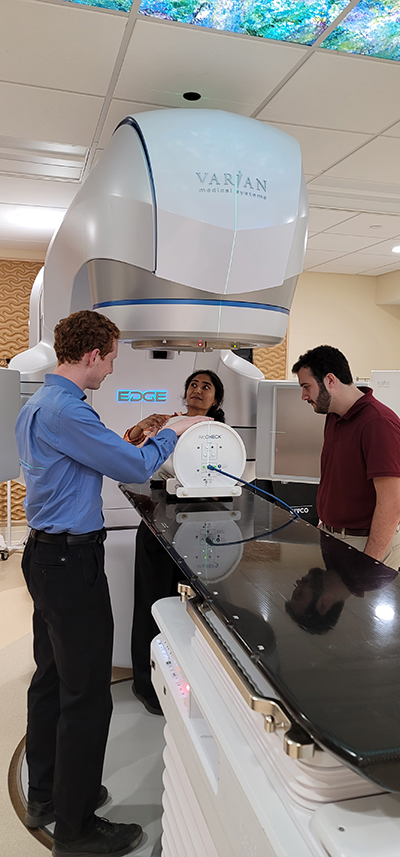
- You will be integrated into faculty laboratories and clinical facilities to work with faculty on a variety of research projects to advance disease diagnosis and treatment.
- Clinical laboratories and internships are available in therapeutic and diagnostic physics at the Purdue Life Science MRI facility, in radiology at Purdue’s College of Veterinary Medicine and at Memorial Medical Hospital and in radiation oncology at the Indiana University School of Medicine Hospital.
- Advanced coursework is offered in oncology, MRI theory and acquisition, magnetic resonance spectroscopy, PET/SPECT imaging and more.
Potential Careers
- Scientist in industries associated with radiological and radiation therapy equipment and support
- Scientist within state and federal government agencies
- Therapeutic medical physicist
- Diagnostic medical physicist
- Medical health physicist
Concentrations
You will work through the core medical physics courses and then follow one of two specialized tracks: therapeutic radiological physics or diagnostic (imaging) radiological physics
Program Quick Facts
Degree Type: Certificate, Master’s, Doctoral
Program Length : Certificate: 9 months (only students with prior PhD are eligible) Master’s: 2
PhD: 4-5 years entering with BS, 2-3 years entering with MS
Location : West Lafayette, IN
Department/School : School of Health Sciences
You will have the opportunity to work directly with medical physics faculty on interdisciplinary projects to advance understanding of image-guided and biology-based therapy; diagnostic imaging of cancer, neurological function and disease; and new uses of particle beams in detection and treatment.
- Ulrike Dydak
- Oluwaseyi (Seyi) Oderinde
- Matthew Scarpelli
- Aaron Specht
- Keith Stantz
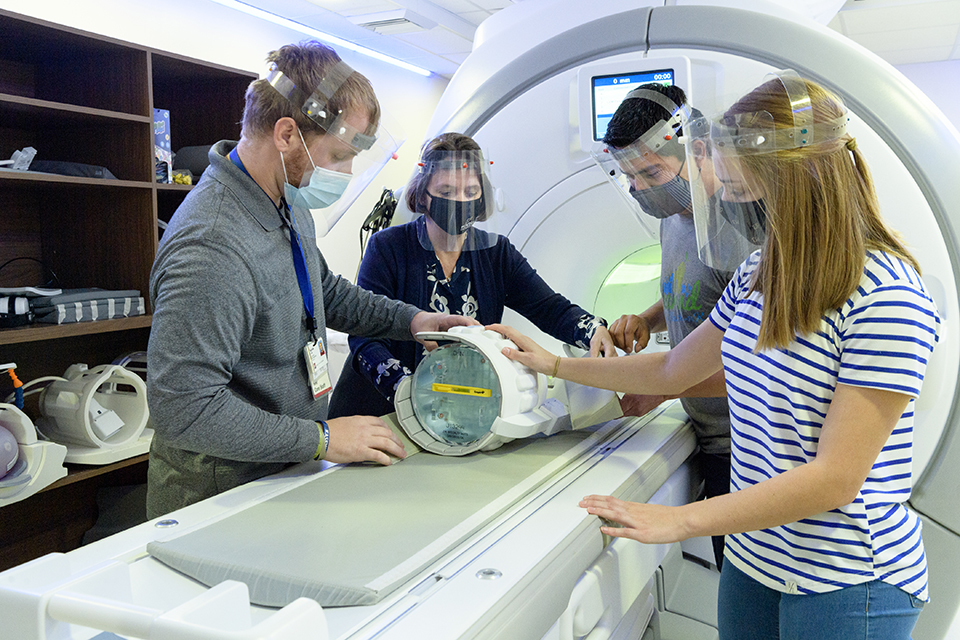
Research Opportunities
- MRI and MRS in diagnosis of neurotoxicity and radiation response
- Neutron and X-ray technologies for human body composition, disease diagnoses, and radiotherapy
- Imaging and tracer development in PET and SPECT
- Dynamic contrast enhanced imaging (CT, PCT) and thermoacoustic in image-guided therapy
- IMRT and normal tissue response to radiation therapy
Research Areas
- Health physics (radiation protection)
- Imaging sciences
- Medical physics
- Occupational and environmental health sciences (industrial hygiene, ergonomics)
Research Facilities
- Life Science MRI facility
- The Birck Nanotechnology Center
- The Bindley Bioscience Center
- The Regenstrief Center for Healthcare Engineering
- Purdue’s Center for the Environment
Admissions/Requirements
Applications submitted prior to January 10, 2023 will be considered for fellowships and awards .
Applicants to the MP program are expected to have an undergraduate degree in physics, engineering or comparable academic training, such as Purdue’s B.S. degree in Pre-Medical Physics. Minimum undergraduate coursework typically include:
- Analytic Geometry and Calculus (2 semester sequence), Multivariate Calculus and Differential Equations (1 semester)
- General Chemistry (2 semester sequence)
- Fundamentals of Biology (2 semester sequence)
- Human Anatomy and Physiology (2 semester sequence)
- Modern Mechanics, Electricity and Optics, Electricity and Optics Laboratory, Modern Physics, Modern Physics Lab, Intermediate Mechanics, and Quantum Mechanics
- Elementary Statistical Methods
Students that have not completed prior coursework in anatomy and physiology upon entry into the program are required to take a 2-semester sequence of anatomy and physiology (BIOL 301/302 or BIOL 203/204). Alternate plans of study are available for students that do not have the equivalent of a B.S. or minor in physics. Students with other deficiencies in their undergraduate curriculum may be accepted or conditionally accepted into the program at the discretion of Head of the School. Students accepted on a conditional basis may be required to take additional 100, 200, 300 or 400 level classes to address coursework deficiencies. A grade of B or better in all 100, 200, 300 or 400 level classes and a cumulative GPA of 3.0 or better at Purdue University is required for students accepted on a conditional basis. Upon completing the identified deficiencies, the Head of the School, in consultation with the RHS Program Director and GC Chair, re-evaluate the admission status of conditionally accepted students and either accept or deny admission into the MP graduate program. Conditionally accepted students that are ultimately denied admission into the MP program are counseled on possibly alternate degree paths at Purdue as well as alternative career paths.

Keith Stantz | Program Director
For questions regarding the medical physics graduate program, please contact [email protected] or our graduate coordinator, Karen Walker, at [email protected] .
MEMP PhD Program
Hst’s memp phd program, is this program a good fit for me.
HST’s Medical Engineering and Medical Physics (MEMP) PhD program offers a unique curriculum for engineers and scientists who want to impact patient care by developing innovations to prevent, diagnose, and treat disease. We're committed to welcoming applicants from a wide range of communities, backgrounds, and experiences.
How is HST’s MEMP PhD program different from other PhD programs?
As a MEMP student, you’ll choose one of 11 technical concentrations and design an individualized curriculum to ground yourself in the foundations of that discipline. You’ll study medical sciences alongside MD students and become fluent in the language and culture of medicine through structured clinical experiences. You’ll select a research project from among laboratories at MIT, Harvard, affiliated hospitals and research institutes , then tackle important questions through the multiple lenses of your technical discipline and your medical training. As a result, you will learn how to ask better questions, identify promising research areas, and translate research findings into real-world medical practice.
What degree will I earn?
You’ll earn a PhD awarded by MIT or by the Harvard Faculty of Arts and Sciences.
What can I do with this degree?
Lead pioneering efforts that translate technical work into innovations that improve human health and shape the future of medicine.
How long will it take me to earn a PhD in HST’s MEMP program?
Similar to other PhD programs in MIT's School of Engineering, the average time-to-degree for MEMP PhD students is less than six years.
What are the degree requirements?
Science / engineering.
Choose one of the established concentration areas and select four courses from the approved list for the chosen area. Current MEMP concentration areas are:
- Aeronautics & Astronautics
- Biological Engineering
- Brain & Cognitive Sciences
- Chemical Engineering
- Computer Science
- Electrical Engineering
- Materials Science & Engineering
- Mechanical Engineering
- Nuclear Engineering
Harvard MEMPs fulfill Basic Science/Engineering Concentration and Qualifying Exam through their collaborating department (SEAS or Biophysics).
Biomedical Sciences and Clinical Requirements
Biomedical sciences core.
- HST030 or HST034: Human Pathology
- HST160: Genetics in Modern Medicine
- HST090: Cardiovascular Pathophysiology
Restricted Electives - two full courses required*
- HST010: Human Anatomy
- HST020: Musculoskeletal Pathophysiology*
- HST100: Respiratory Pathophysiology**
- HST110: Renal Pathophysiology**
- HST130: Introduction to Neuroscience
- HST162: Molecular Diagnostics and Bioinformatics*
- HST164: Principles of Biomedical Imaging*
- HST175: Cellular & Molecular Immunology
* May combine two half-courses to count as one full course **Must choose at least one of HST100, HST110
Clinical Core
- HST201: Intro. to Clinical Medicine I and HST202: Intro. to Clinical Medicine II
- HST207: Intro. to Clinical Medicine
PhD Thesis Guide
Letter of intent #1:.
Research advisor and topic. Due by April 30 of 2nd year.
Letter of Intent #2:
Tentative thesis committee. Due by April 30 of 3rd year.
Thesis proposal:
Defended before thesis committee. Due by April 30 of 4th year.
Final Thesis:
Public defense and submission of final thesis document.
Harvard MEMPs must an electronic copy of the final thesis including the signed cover sheet. Harvard MEMPs should not register for HST.ThG.
Qualifying Exam
TQE: Technical qualification based on performance in four concentration area courses and Pathology
OQE: Oral examination to evaluate ability to integrate information from diverse sources into a coherent research proposal and to defend that proposal
Professional Skills
Hst500: frontiers in (bio)medical engineering and physics.
Required spring of first year
HST590: Biomedical Engineering Seminar
Required fall semester of first year. Minimum of four semesters required; one on responsible conduct of research and three electives. Topics rotate.
Required for all MEMP students. (Biophysics students may substitute MedSci 300 for HST590 term on responsible conduct of research.)
Professional Perspectives
Required once during PhD enrollment
What can I expect?
You’ll begin by choosing a concentration in a classical discipline of engineering or physical science. During your first two years in HST, you’ll complete a series of courses to learn the fundamentals of your chosen area.
In parallel, you’ll become conversant in the biomedical sciences through preclinical coursework in pathology and pathophysiology, learning side-by-side with HST MD students.
With that foundation, you’ll engage in truly immersive clinical experiences, gaining a hands-on understanding of clinical care, medical decision-making, and the role of technology in medical practice. These experiences will help you become fluent in the language and culture of medicine and gain a first-hand understanding of the opportunities for — and constraints on — applying scientific and technological innovations in health care.
You’ll also take part in two seminar classes that help you to integrate science and engineering with medicine, while developing your professional skills. Then you’ll design an individualized professional perspectives experience that allows you to explore career paths in an area of your choice: academia, medicine, industry, entrepreneurship, or the public sector.
A two-stage qualifying examination tests your proficiency in your concentration area, your skill at integrating information from diverse sources into a coherent research proposal, and your ability to defend that research proposal in an oral presentation.
Finally, as the culmination of your training, you’ll investigate an important problem at the intersection of science, technology, and medicine through an individualized thesis research project, with opportunities to be mentored by faculty in laboratories at MIT, Harvard, and affiliated teaching hospitals.
Interested in applying? Learn about the application process here.

HST MEMP grad Grissel Cervantes-Jaramillo’s road to a PhD began in Cuba and wound through Florida
PhD in Bioengineering - Medical Physics Concentration
Admission deadline, admission process.
Our Admissions Committee takes a holistic approach to evaluating applications. Along with a solid academic record and communication skills, our program is looking for individuals who desire to make an impact in the field of medical physics. An interview is required for admission. Select applicants will be invited to interview in person. Admitted applicants will be invited for Visit Day .
Applicants who wish to be considered for admission to the Master of Science in Medical Physics program if not admitted to the Bioengineering PhD program must apply to the MSMP program by the deadline. Applicants will need to use different email addresses for the Bioengineering PhD application (through the School of Engineering and Applied Science) and MSMP application (through the Perelman School of Medicine). No MS application fee is required. Email the MPGP Team at [email protected] to request a fee waiver code to put on the MS application for admission in order to waive the application fee.
Prerequisite Requirements (note explanations marked by *)
- Bachelor’s degree in physics, engineering, or physical sciences discipline from an accredited institution (or the equivalent of a U.S. four-year bachelor’s degree)
- * Minimum of an undergraduate minor in physics or its equivalent
- Complete one computer science/programming course (one semester/course). This course must be listed on the applicant's transcript
- Applicants who have completed or will be completing a master's degree in medical physics from a CAMPEP-accredited program are not eligible for the PhD in Bioengineering - Medical Physics Concentration.
Application Requirements (note explanations marked by *)
- Completion of the School of Engineering & Applied Science’s Bioengineering PhD program application for admission and all stated requirements on the Doctoral Program Admissions page . Select the Medical Physics Concentration within the application.
- An unofficial transcript in English from each university or college where you earned course credit should be uploaded into the Bioengineering PhD application. An unofficial transcript must show the applicant name, institution name, names of courses completed, and grades earned. If an unofficial transcript does not show this information, you must submit an official transcript. Official transcripts should be emailed to the MPGP Team at [email protected] directly from the issuing institution's official electronic delivery service.
- Three letters of recommendation, including at least one from a faculty member who is familiar with your scholarly abilities. (Contact information of recommenders required in online application; application system will ask these individuals to upload their letters)
- Personal statement: In 1000 words or less, please describe your career objectives and reasons for choosing the PhD in Bioengineering - Medical Physics Concentration program at Penn, including any previous experience with the field of medical physics. Also, use this as an opportunity to tell us about yourself and help us get to know you better. A well-written and thoughtful, though concise, essay is an important part of your application.
- Completion of Intent to Apply to the Medical Physics Concentration form
- **Additional requirements for applicants with degrees earned outside of the U.S.
It is preferred that applicants:
- Take undergraduate coursework in these subject areas : Differential Equations, calculus (four semesters/courses), chemistry (two semesters/courses), biology (one semester/course)
*Minimum of an Undergraduate Minor in Physics or its Equivalent
- A minor in physics, required by CAMPEP, is defined as two calculus-based introductory physics courses and at least three upper-division (junior- or senior-level) undergraduate physics courses . Upper-division physics courses include Electricity and Magnetism (preferred), Atomic Physics (preferred), Modern Physics (preferred), Quantum Mechanics (preferred), Classical Mechanics (preferred), Optics, Nuclear Physics, and Heat & Thermodynamics. The advanced physics courses should address theoretical principles from a physics curriculum. Courses that are primarily applied and related to engineering, chemistry, health, or medical physics are not acceptable.
- Per the American Board of Radiology (ABR), standards for course acceptability are: 1) the course must appear on an official transcript; 2) the course must be equivalent to a standard 3-credit course; and 3) the course must have a passing standard. It is recommended that you contact the professor of the course to inquire if you are unsure of whether a course meets these standards, or if you are unsure if the course is considered introductory or upper-division at the undergraduate level as compared to the other physics courses offered at the institution. Massive open online courses (MOOC) such as EdX and Coursera typically do not meet these standards and thus are not acceptable.
- Applicants may earn the equivalency of a physics minor at any regionally accredited institution. Transcripts of all courses taken for credit are a requirement of the application.
**Additional Requirements for Applicants with Degrees Earned Outside of the U.S.
- University of Pennsylvania
- Department: SEAS Graduate Admissions (Engineering)
- Educational Perspectives reports can be directly selected from within the online application. If using Educational Perspectives, it is encouraged to submit your application at least two months in advance to allow sufficient time for the transcript evaluation process.
- The minimum TOEFL score required for admissions consideration is: 100 (iBT), 250 (CBT) or 600 (PBT).
- The minimum IELTS score required for admissions consideration is 7.
- The minimum Duolingo English Test (DET) score required for admissions consideration is 130.
- The Medical Physics Graduate Programs reserves the right to request an English proficiency test or interview from any applicant, may make enrollment in English language courses a condition for admission, and/or may subsequently require that an admitted student enroll in English language courses based on an assessment of the student’s English language skills in the classroom.
Questions about the Bioengineering PhD application should be sent to SEAS Enrollment Specialist Abby Whittington or via the inquiry form .
Questions about the Medical Physics Concentration application process or the Intent to Apply to the Medical Physics Concentration form should be sent to the MPGP Team .
- Current Students
UTHealth - Houston's Health University
Uthealth - graduate school of biomedical sciences.
- Why the GSBS
- Our Location
- Information Technology
- Digital Classroom
- Campus Safety
- Classroom Calendar
- Administered by MD Anderson and UTHealth Houston
- Located in The Texas Medical Center (TMC), the world's largest medical center
- Accredited by the Southern Association of Colleges and School Commission on Colleges (SACSCOC)
- Over 600 faculty members with expertise in the latest biomedical research
- Genetic Counseling
- Medical Physics
- Milestone Requirements
- Faculty Seeking MS Students

Explore GSBS Labs
- Cancer Biology
- Genetics & Epigenetics
- Microbiology & Infectious Diseases
- Molecular & Translational Biology
- Neuroscience
- Quantitative Sciences
- Therapeutics & Pharmacology
Research Interests
- Program Directory
- Faculty Seeking PhD Students

- Message From the Director
- MD Anderson Cancer Center UTHealth Graduate School of Biomedical Sciences
- McGovern Medical School
- MD Anderson Cancer Center
- Center for Clinical Translational Sciences

Student Research Day 2020
- Admissions Overview
- Requirements & Instructions
- Financial Assistance
- Recruitment Schedule
- What factors are considered in admissions decisions?
- What is the minimum GPA required to apply?
- Do you require interviews?
- When will I be notified regarding interviews?
- What are the application deadlines?
- What if my recommender does not have an institutional letterhead or an institutional email address?
- How can I get an assistantship?
- How can I get an assistantship if I am seeking a MS degree?

Admissions Office
6767 Bertner Avenue S3.8344 Mitchell BSRB Houston TX 77030
- Summer Undergraduate Research Programs
- Biochemistry
- Bioinformatics
- Cell Biology
- Developmental Biology
- Epigenetics
- Infectious Diseases
- Microbiology
- Pharmacology
- Therapeutics
- Translational Research
- Discover Houston
- Explore Campus
- Career Development
- Parking, Transportation, Disability, Worklife, More
- Student Support
- Graduate Student Association
- Association of Minority Biomedical Researchers
- Association of Science Communication
- Community Outreach
- First Generation Student Group
- International Student Association
- LGBTQ+ Student Alliance
- Student InterCouncil

About the GSBS
Quick facts, thesis based ms programs, specialized ms, individualized ms program in biomedical sciences, phd programs, md/phd program, participating institutions/entities.

Admission FAQs
- Biostatistics
- Infectious Disease
Student Life
Student organizations.
nav = Medical Physics
GSBS Medical Physics Program
The Medical Physics Graduate Program
Medical physics is a profession that combines principles of physics and engineering with those of biology and medicine to effect better diagnosis and treatment of human disease while ensuring the safety of the public, our patients and those caring for them.
The Medical Physics Graduate Program offers the Specialized Master of Science degree and the Master of Science and Doctor of Philosophy degrees through the MD Anderson Cancer Center UTHealth Houston Graduate School of Biomedical Sciences. Two UT components, UTHealth Houston and MD Anderson, jointly support the program, with the majority of faculty and students, as well as the program administration, working at MD Anderson.
The S.M.S. degree is a professional master's degree that prepares the student for clinical practice as a medical physicist. The Ph.D. degree is intended for the student who is preparing for a career that includes a strong research component. The two degree tracks have similar didactic curricula, but the S.M.S. research project is typically more clinically focused and shorter in duration than the research work for the M.S. and Ph.D. degrees.
In addition to the SMS and PhD degree programs in Medical Physics, the GSBS offers a Graduate Certificate in Medical Physics. The certificate program is intended for those who already have a PhD in physics or a related discipline and are interested in obtaining the didactic education in medical physics that is required by residency programs and by the American Board of Radiology. Some of the requirements for admission to this program are a PhD in physics or else a PhD in a related discipline plus at least a minor in physics and medical physics research experience at The University of Texas MD Anderson or UTHealth Houston.
Photo (Right): Functional MRI (fMRI) and diffusion tensor imaging (DTI) tractography for presurgical evaluation of brain tumor resection (image courtesy of Anthony Liu, PhD)

Medical Physics Program Resources
How to apply.
Students who wish to study medical physics should apply online through the GSBS website
When your application is complete (including all of the required documentation such as transcripts and letters of reference), the GSBS will forward it to the program admission committee for consideration. Strict adherence to the deadlines is advised.
If you are applying to the Specialized Master of Science Program ("SMS"), which is our professionally oriented terminal master’s degree, select "M.S." as the Degree Plan. If you are applying to the M.S./Ph.D. program, select "Ph.D." as the Degree Plan, even if you expect to earn the M.S. degree on the way to the Ph.D. Most of our Ph.D. students take advantage of the opportunities that the Graduate School offers to by-pass the master’s degree en route to the Ph.D.
Under Areas of Research Interest, you need not select secondary areas of study if your only interest in the MD Anderson Cancer Center UTHealth Graduate School of Biomedical Sciences is our Medical Physics program.
Review Process
The program admission committee reviews applications on a rolling basis. Applicants who are especially promising will be invited to visit the GSBS and the program for an interview. Typically, more applicants are interviewed than can be offered admission.
Over the course of the reviewing season, the program admission committee will recommend to the Dean of the GSBS that offers be extended to the highest ranking applicants. All of those offers will be honored through April 15. However, because our program has a maximum number of funded positions in the incoming class each year, applicants who accept another offer are asked to decline ours promptly so that another meritorious applicant may be extended an offer.
We attempt to have interviewed every applicant to whom we make an offer. In extraordinary circumstances, this has been by telephone or over the Internet, but normally interviews are conducted in person in Houston. Ideally these would be during GSBS visitation events.
The interview visit is a time for the program and the applicant to get to know each other even better than the application documents allow. Interviewees have a student host to guide them around and to talk about what the program is really like and what Houston is really like.
The applicant typically will talk to half a dozen faculty members and at least as many students. The content of the interviews varies with the interests and attitudes of the interviewer, so the best advice that we can give for preparation is to know your facts (e.g., the title of your senior thesis project, if you are doing one) and to be yourself.
The Profession of Medical Physics
Medical physics is a field of study and practice that applies the facts and principles of physics and engineering to medical practice. It is distinct from biomedical engineering, biophysics and health physics in its focus on patient care. Medical physics is a profession because its practitioners work independently, albeit often as members of a health care team, and we take personal responsibility for the quality of our work.
There are two main specialties within medical physics, therapy and imaging. Therapy is the delivery of ionizing radiation with palliative or curative intent and imaging uses ionizing and nonionizing radiation for diagnostic purposes. some medical physicists practice all aspects of medical physics, but specialization as a therapeutic radiological physicist, diagnostic radiological physicist, medical nuclear physicist or medical health physicist is becoming more typical.
Medical physics requires a solid undergraduate preparation in physics or another technical discipline (for example, nuclear engineering) and graduate study. While many current medical physicists studied pure physics or related engineering subjects at the graduate level, increasingly graduate study in medical physics per se is now the predominant route of entry into the profession. Graduate programs in medical physics and residency programs in medical physics may be certified by the Commission on Accreditation of Medical Physics Educational Programs (CAMPEP). Not only does CAMPEP accreditation betoken a high quality program, but graduation from a CAMPEP - accredited graduate program and a CAMPEP - accredited residency program are prerequisites to certification by the largest certifying board.
Medical physicists demonstrate their preparation and professional competence by achieving certification. The predominant certifying board in the U.S. is the American Board of Radiology, which, along with the American Board of Health Physics and the American Board of Science in Nuclear Medicine, administers certification examinations. These examinations typically consist of a written section covering basic medical physics, a second written section focusing on a particular specialty (e.g., therapeutic radiological physics, diagnostic radiological physics, medical nuclear physics, medical health physics, magnetic resonance imaging physics, or molecular imaging), and an oral examination. One may not take the examinations until one has earned appropriate educational credentials and has accumulated satisfactory practical experience through residency.
A number of states in the U.S., of which the first was Texas, license medical physics as a profession. They do this as a means of protecting the public safety and welfare. In Texas, one may not practice medical physics without a license. Texas issues temporary licenses to medical physicists who are preparing for their certification examinations by gaining practical experience, either as on-the-job training or in a clinical physics residency program. Temporary licensees must practice under the direct supervision of a fully licensed medical physicist. Medical physicists with full licenses may practice their licensed specialty independently, their preparation for which is demonstrated by education, by experience and by board certification.
Medical physicists in the U.S. have one primary professional organization, the American Association of Physicists in Medicine (AAPM). Many medical societies also welcome medical physicists and have strong and active membership among medical physicists.
Medical physicists might practice privately — often consulting for several institutions — or work on a hospital staff or in an academic healthcare institution. We work closely with radiation oncologists, radiologists, nuclear medicine physicians, dosimetrists, nurses, a variety of medical technology specialists and hospital administrators. Our work requires strong scientific and technical abilities, clear communication, good people skills and the capability to work carefully, accurately, thoroughly and promptly. People's well-being depends upon the quality of our work.
To learn more about the profession of medical physics, visit
- The American Association of Physicists in Medicine
- The American Board of Radiology
- The American Board of Medical Physics
- The American Board of Science in Nuclear Medicine
- The Commission for the Accreditation of Medical Physics Educational Programs
- The Texas Medical Board
Among the journals that publish the research work of medical physicists are
- Journal of Applied Clinical Medical Physics
- International Journal of Radiation Oncology, Biology and Physics
- Academic Radiology
- Journal of Nuclear Medicine

Farach-Carson named 2023 Oldham faculty award recipient

MD Anderson CPRIT Research Training Program announces 2022-2023 scholars

4 GSBS students awarded UTHealth CPRIT fellowships

MD Anderson CPRIT Research Training Program announces 2021-2022 scholars
Robert j. shalek fellowship.
In the period between 1950 and 1984, Robert J. Shalek, for whom this fellowship is named, worked at The University of Texas MD Anderson Cancer Center. During that time the institution grew from small beginnings in temporary buildings to a leading cancer center with a large physical plant and over 6,000 employees.
During the same period medical physics, which had started in the United States around 1915, but had languished as a profession, took guidance from the well-developed British example and grew into a confident and respected profession. Dr. Shalek was shaped by and contributed to these events.
Following Drs. Leonard Grimmett and Warren Sinclair, both very experienced medical physicists from England, he served as head, or chairman, of the Physics Department from 1960 to 1984. Under his direction, the department became recognized as a major research and teaching center in medical physics.
Click here to learn more about Robert J. Shalek Fellowship
Medical Physics Information
2023 | 2022 | 2021 | 2020 | 2019 | 2018 | 2017 | 2016 | 2015 | 2014 | 2013 | 2012 | 2011 | 2010 | 2009 | 2008 | 2007 | 2006
2022 Fall Student Handbook

Photo (Left): The IROC-Houston IMRT head & neck phantom about to be scanned in a CT simulator during the COVID-19 pandemic (photo courtesy of Sharbacha Edward)
Department of Radiation Oncology
Medical School
- Department History
- Radiation Oncology Residents
- Evaluation of Curricula
- Sample Academic Plans
- Program Faculty
- Alumni Spotlight
- New Student Orientation
- Student Progress Evaluation
- Application Process
- Benefits & Stipends
- Current Medical Residents
- Radiation Physics and Radiobiology Courses
- Well-Being & Professional Development
- Life in Minnesota
- Resident News & Kudos
- Current Medical Physics Residents
- Brachytherapy Research Lab
- Brain Tumor Translational Research Lab
- Molecular Cancer Therapeutics Lab
- Radiobiology Lab
- Patient Care
- Radiation Oncology Anniversary
Medical Physics Graduate Program
The Medical Physics Graduate Program is accredited by the Commission on Accreditation of Medical Physics Education Programs (CAMPEP) and offers MS and PhD degrees.
The goal of the program is to prepare students for entering a clinical medical physics residency program in therapy or imaging physics and/or to pursue a career in research and teaching in radiation therapy, radiology, or magnetic resonance imaging.
The program meets the requirements of the Graduate School of the University of Minnesota, AAPM Reports 197, 197S, and the CAMPEP Standards for Accreditation of Graduate Educational Programs.
The Medical Physics Graduate Program generally admits students in the Fall semester. This program does not grant conditional admissions. Deadline for Fall 2025 admissions will be January 5, 2025.
+ What is Medical Physics?
Medical physicists are professionals with education and specialist training in the concepts and techniques of applying physics in medicine. Medical Physicists work in clinical, academic or research institutions. (Source: IOMP)
Medical physicists are concerned with three areas of activity:
- Clinical service and consultation in radiation oncology and radiology departments
- Research and development in areas such as cancer, heart disease, and others
- Teaching medical physics students, resident physicians, and radiology and radiation therapy technology students
(Source: AAPM)
AAPM's public education web page describing medical physics:
https://www.medicalradiationinfo.org/medical-physics/
AAPM's public education web page describing a career in medical physics:
https://www.medicalradiationinfo.org/careers/

+ Program Governance
The program governance includes the Director of Graduate Studies (DGS), the Steering Committee, and the Admissions Committee. The Steering Committee addresses the long term needs of the program and any short term issues. The Admissions Committee reviews applications for admissions and makes admissions decisions.
The majority of the instructors for the program are from the Departments of Radiation Oncology and Radiology at the University of Minnesota. Faculty are listed as full if they advise and support student(s) in the program at least once every five years, actively participate in the program by serving on student(s) MS and PhD committees, teaching courses, or serve in one of the graduate program committees.
+ Facilities
The facilities and clinical equipment of the University of Minnesota Medical Center are available to the faculty and students of the graduate program in Medical Physics. These include departments of Radiation Oncology and Radiology, including The Center for Magnetic Resonance Research .
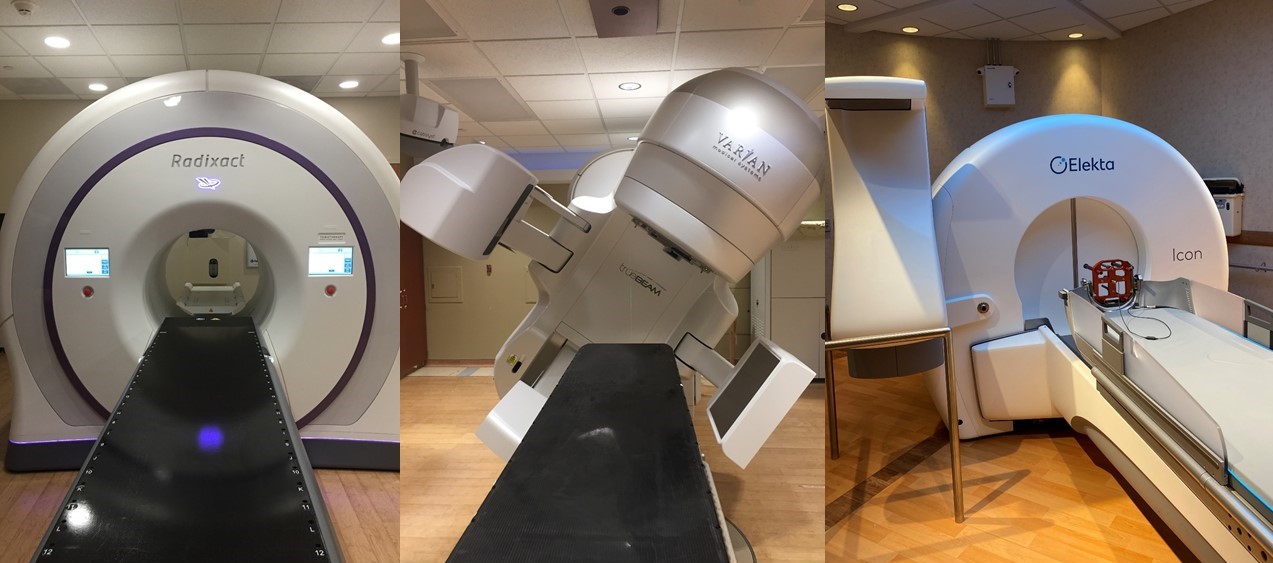
Additional facilties within various University of Minnesota departments and centers are also available to graduate students as needed.
The full resources of the University of Minnesota Library systems both online and its physical holdings are available to all graduate students of the University of Minnesota. Other materials not directly accessible within the University of Minnesota Library system can be acquired via interlibrary loan.
Read a general description of the University of Minnesota Libraries .
Read about particular library services offered to graduate students.
+ Active Research Projects
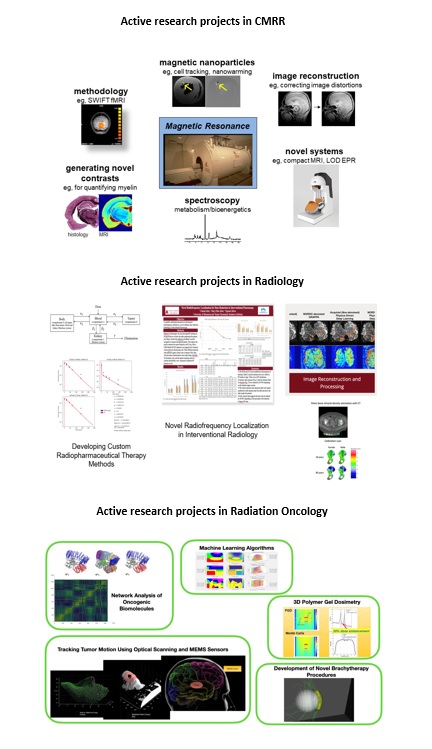
+ Recent Student Publications and Presentations
Aapm 2023 presentations:, ismrm 2023 presentations:, other presentations:, + graduate outcomes.
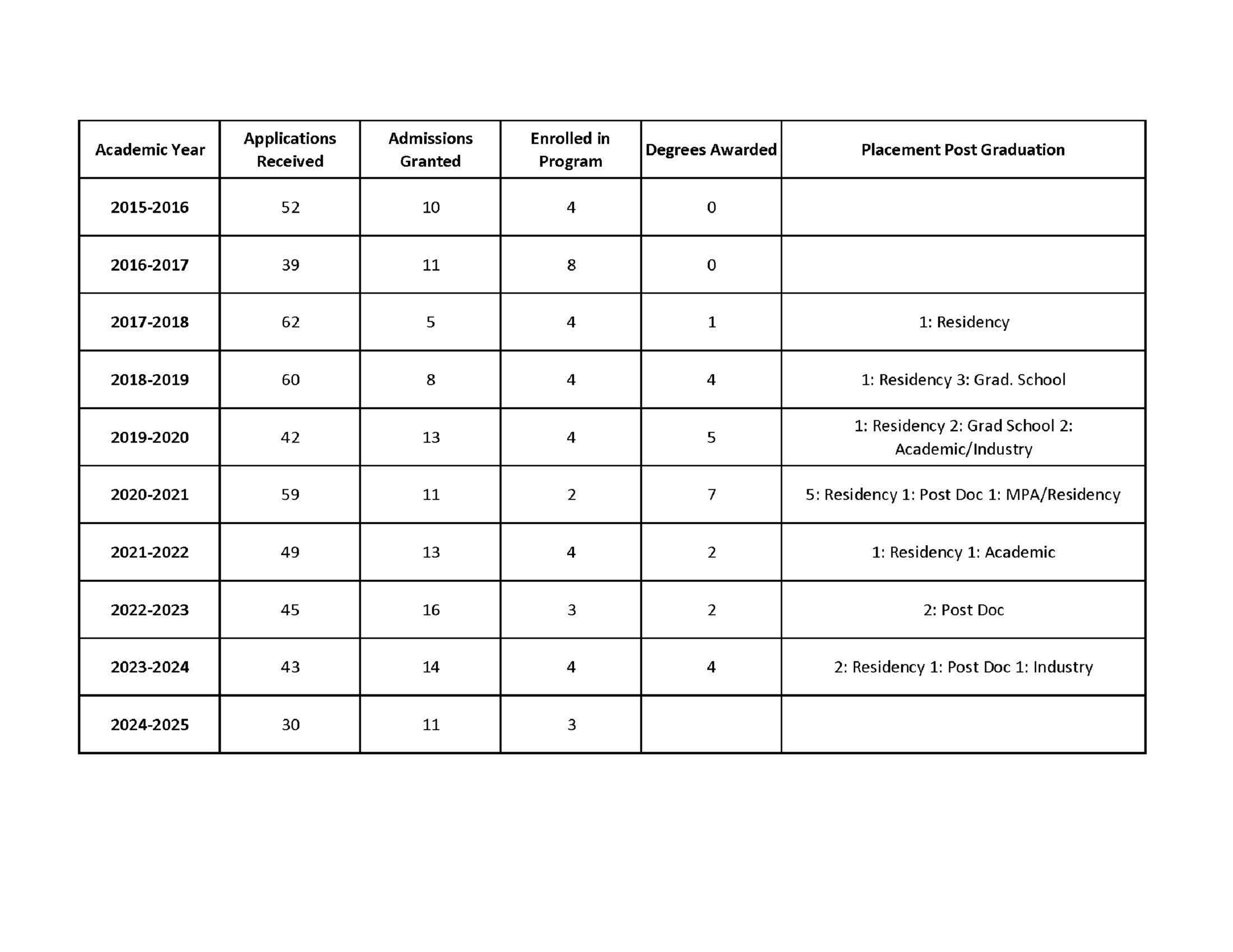
Program History
This graduate program was started as an interdisciplinary graduate program under the name Biophysical Sciences in the 1950s by Dr. Otto Schmidt to encourage collaboration among biologists, chemists, and physicists. Then, as now, faculty had their salaried appointments in various home departments, including departments within the Medical School, but participated in Biophysical Sciences because of their interests in collaborative, interdisciplinary projects.
- 1960 - 1970
- 1980 - 1990
- 2000 - Present
By the late 1960s and early 1970s, disciplines such as biophysics, biochemistry, physical chemistry, etc. were established in the mainstream, so the emphasis in Biophysical Sciences shifted to health informatics (integration of computers for modeling and data base analysis) and medical applications of biochemistry with Dr. Gene Ackerman and Dr. Russell K. Hobbie as Directors of Graduate Studies.
By the late 1980s the computerization of all disciplines had become routine and most of the faculty had minimized their participation in the Biophysical Sciences Program. At about that time, however, a resurgence of interest in applications of various disciplines to problems in “radiologic sciences” – medical imaging, radiation therapy, and radiobiology – resulted in a renewal of interest in the program. In the US, the field of radiologic science is known as a profession by the term “Medical Physics”. Thus, by the early 1990’s the emphasis of the program had shifted to Medical Physics. In 1993, the program underwent an internal review under the direction of Associate Dean Kenneth Zimmerman at the request of Vice President and Dean Anne Petersen. The purpose of the review was to explore the future of involvement of the Medical School in the program. E. Russell Ritenour, became Director of Graduate Studies at that time.
In 2012, the name of the Biophysical Sciences and Medical Physics program was changed to Medical Physics to more closely align the name of the program with the focus of the majority of the students in the program. The program as it currently stands focuses on Medical Physics but does not preclude the student from having a graduate project that is outside the traditional borders of Medical Physics. This is due to the fact that there are several professors associated with the program that have interests aligned with Medical Physics that are not purely clinical in focus. To aid in this transition of the program and to promote the accreditation process, Bruce J. Gerbi, PhD was installed as the Program Director. Upon retirement of Dr. Gerbi, Parham Alaei, PhD was elected as program director in May 2017.
Education & Training
- Curriculum & Courses
- Medical Residency Program
- Medical Physics Residency Program
For specific program information, please contact:
Parham Alaei, PhD, Professor University of Minnesota Medical School Department of Radiation Oncology 612-626-6505 [email protected] Mayo Mail Code 494 420 Delaware Street SE Minneapolis, Minnesota 55455
For general program information, please contact:
- See us on twitter

Stanford Biomedical Physics (BMP) PhD Program
Medical Physics Track Under BMP PhD Program
Program Overview
The Departments of Radiology and Radiation Oncology are proud to offer a new PhD program in Biomedical Physics (BMP). This program, supported by and integrating faculty from these two departments, was formally approved by the university in May 2021 and welcomed its first class of students in fall 2022. This program aims to offer unique interdisciplinary training in physics and engineering applied to solve clinical problems. This burgeoning translational field integrates topics including medical physics, diagnostic imaging, and molecular imaging and diagnostics. Synergistic with multiple departments and institutes from the School of Medicine, Engineering, and Humanities and Sciences, the BMP program leverages Stanford’s outstanding faculty, research, and resources to create a world-class training program. It targets physics, bioscience, and engineering students seeking to become the next generation of leaders focused on addressing the technical challenges of clinical medicine.
Students admitted to the BMP PhD program can choose to complete a CAMPEP curriculum that will allow them to pursue medical physics residencies and certification by the American Board of Radiology (ABR) in preparation for a career in clinical physics. This subtrack of BMP is offered in collaboration with the Medical Physics Certificate Program.
Admission Requirements and Process
Prerequisites
All students pursuing the BMP PhD program will have to complete the requirements for the BMP PhD program. Undergraduates with a major or minor in physics or equivalent of a minor in physics are encouraged to apply if interested in pursuing the Medical Physics Track.
Degree Requirements
- The Medical Physics Track follows the BMP PhD degree requirement described on Stanford Bulletin , but with different course requirements. In addition to 3 listed core courses, students are required to finish 4 more courses including:
- BMP 251 Medical Physics and Dosimetry
- BMP 252 Radiation Therapy Physics
- BMP 269A Medical Imaging Systems l, and
- BMP 269B Medical Imaging Systems lI
Students must complete the BMP requirements and also take the required CAMPEP courses.
Medical Physics CAMPEP students
Enrolled in Program

No graduates at this time.
Admissions and Graduation Data

- Accredited Degree Programs
- General Information/ Information for Program Directors
- Online Self Study Submission
- Graduate Accreditation Letters
- Standards for Accreditation of Graduate Educational Programs
- Supplementary Graduate Templates
- Graduate Program Sample Disclosure Statement
- 2022 Graduate Program Annual Report Analysis
- Graduate Application Template
- 2013 Supplement to Annual Graduate Program Survey
- Graduate Reaccreditation Report Template
- Graduate Report Template
- Graduate Education Program Committee Members
- 2009 ABR UPDATE
- Residency Education Programs
- Professional Doctorate in Medical Physics (DMP) Degree Programs
- Certificate Programs
- Closed Programs
- Continuing Education
- Public Disclosure
- Accreditation FAQs
- Information for Board/Committee Members

CAMPEP Accredited Graduate Programs in Medical Physics
Entries Last Updated April 18, 2024
† Indicates institutions offering tracks within their degree program that are not CAMPEP compliant. Students graduating from these institutions who have completed the CAMPEP accredited program will be identified through an appropriate certificate awarded on completion of the program.
‡ Indicates institutions that are accredited but are non-compliant with one or more CAMPEP standards. Public disclosure statements can be found at: http://www.campep.org/PublicDisclosure.asp
‡‡ Provisional accreditation for a period of up to three years may be granted at the discretion of the CAMPEP Board if circumstances preclude the awarding of initial or full accreditation. The most common reason for such provisional accreditation is in the case of a new program that has not yet graduated or admitted any students. Provisional accreditation may be extended when all the compliance conditions have been met.
Brown University Department of Radiation Oncology 225 Dyer Street Providence RI 02903 (401) 606-4283 Accredited degrees available:M.S. Program Director: Eric Klein, Ph.D. [email protected] https://www.brown.edu/med-physics-graduate-program/home
Carleton University † Physics Department 1125 Colonel By Drive Ottawa, ON K1S 5B6 CANADA (613) 520-2600 Ext:4053 Accredited degrees available: Ph.D. Program Director: Emily C. Heath, Ph.D. [email protected] https://physics.carleton.ca/ompi/graduate-studies
Columbia University Department of Applied Physics and Applied Mathematics 500 West 120th St., 200 S. W. Mudd, MC 4701 New York, NY 10027 (212) 854-4457 Fax: (212) 854-8257 Accredited degrees available:MS. Program Director: I. Cevdet Noyan, Ph.D. [email protected] https://apam.columbia.edu/medical-physics
Creighton University Department of Physics 2500 California Plaza Omaha, NE 68178 (402) 280-2159 / Fax: (402) 280-2140 Accredited degrees available: MS. Program Director: Michael G. Nichols, Ph.D. [email protected] https://www.creighton.edu/academics/programs/medical-physics-ms https://physics.creighton.edu https://physics.creighton.edu/content/ms-medical-physics-program-statistics
Dalhousie University Nova Scotia Health Authority 5820 University Avenue Room 3001A Halifax NS B3H 1V7 Canada (902) 473-6191 / Fax: Accredited degrees available:MS.,Ph.D. Program Director: Alasdair Syme, Ph.D. [email protected] http://www.dal.ca/academics/programs/graduate/medical-physics.html
Dartmouth College Thayer School of Engineering 14 Engineering Drive Hanover, NH 03755 603-650-6442/ Fax: Accredited degrees: Ph.D. Program Director: David Gladstone, Sc.D. [email protected] http://sites.dartmouth.edu/medphys/
Duke University † Medical Physics Graduate Program 2424 Erwin Road Suite 302 Durham, NC 27705 (919) 699-4775 Fax: (919) 684-1491 Accredited degrees available:M.S.,Ph.D. Program Director: Mark Oldham, Ph.D. [email protected] http://medicalphysics.duke.edu/
East Carolina University† Medical and Biomedical Physics Graduate Programs Department of Physics Mailstop #563 Greenville, NC 27858 Accredited degrees available: M.S., Medical Physics., Biomedical Physics Program Director: Michael Dingfelder,Ph.D. (252) 328-6739 / (252) 328-6314 [email protected] https://physics.ecu.edu/ https://physics.ecu.edu/facts-and-figures/
Florida Atlantic University Department of Physics Medical Physics Programs 777 Glades Road Boca Raton, FL 33431 Accredited degrees available: M.S., Medical Physics Program Director: Theodora Leventouri, Ph.D. (561) 297-2695 / Fax: (561) 297-2662 [email protected] http://physics.fau.edu/programs/psmmp/index.php Georgetown University Department of Medical Physics 3970 Reservoir Road NW Washington DC 20057 Accredited degrees available: M.S., Medical Physics Program Director: Stanley Fricke. Ph.D. (202)687-2232 / Fax: 253-681-9619 [email protected]
Georgia Institute of Technology Medical Physics Programs 770 State Street, RM-3-39S Atlanta, GA 30332-0745 Accredited degrees available: M.S., Ph.D. Program Director: Steven Biegalski, Ph.D. (404) 385-5973 [email protected]
Hofstra University Department of Physics and Astronomy Hofstra College of Liberal Arts and Sciences 151 Hofstra University, 102 Berliner Hall Hempstead, NY 11549-1000 Medical Degrees available: M.S., Medical Physics Program Director: Jenghwa Chang, Ph.D. (516)321-3136 / Fax (516)470-8445 [email protected] hofstra.edu/medicalphysics
Indiana University/Purdue University Joint Medical Physics Program Purdue University School of Health Sciences 550 Stadium Mall Drive West Lafayette, IN 47907-2051 Program Director: Ulrike Dydak, Ph.D. Tel: (765) 494-0550 / Fax: (765) 496-1377 Accredited degrees available: M.S., Ph.D. [email protected] http://www.purdue.edu/hhs/hsci/students/graduate/programs/medical_physics.html
Johns Hopkins University CRB II, 4M61 1550 Orleans St Baltimore, MD 21231 Program Director: George Sgouros, Ph.D. Tel: (410) 614-0116 / Fax: (413) 487-3753 [email protected]
Louisiana State University Department of Physics and Astronomy 202 Nicholson Hall Baton Rouge, LA 70803-4001 Program Director: Wayne D. Newhauser, Ph.D. email: [email protected] Program Administrator Tel: (225) 578-2163 / Fax (225) 578-0824 Accredited degrees available: M.S. in Medical Physics and Health Physics,Ph.D. http://www.phys.lsu.edu/medphys/
McGill University Department of Medical Physics McGill University Health Centre (Glen Site) DS1 7141 1001 boul. Decarie Montreal, Quebec H4A 3J1, Canada Program Director: Shirin A. Enger, Ph.D. Tel: (514) 934-1934 (44161)/ Fax: (514) 934-8229 Accredited degrees available: M.S., Ph.D [email protected] http://www.mcgill.ca/medphys/academic
McMaster University 699 Concession Street Hamilton ,Ontario CANADA Program Director: Marcin Wierzbicki, Ph,D. Tel: (905) 387-9711 [email protected]
National University of Ireland, Galway School of Physics Newcastle Road Galway, Ireland Accredited degrees: M.S., Medical Physics Program Director:Christopher Kleefeld, Ph.D. 353 (0) 91-495383 / Fax: 353 (0) 91-494584 [email protected]
Oregon Health and Science University Medical Physics Graduate Program 2730 SW Moody Avenue Portland, OR 97201 Program Director: Thomas Griglock, Ph.D. [email protected] Tel: (503) 494-1214 / Fax: (503) 494-7037 Accredited Degrees Available: M.S., Ph.D. https://www.ohsu.edu/school-of-medicine/medical-physics-graduate-program San Diego State University Physics-MC1233 5500 Campanile Drive San Diego, CA 92182 Program Director: Usha Sinha, Ph.D. (619) 594-1791 / Fax: (619) 594-5485 Accredited degrees available: M.S. [email protected]
SUNY Stony Brook University† Radiology Department HSC L-4 RM 092 Stony Brook, NY 11794 Program Director: Terry M. Button, Ph.D. (516) 444-3841 / Fax: (516) 444-7538 Accredited degrees available: M.S., Ph.D. [email protected] http://bme.sunysb.edu/grad/medicalphysics.html The University of Texas MD Anderson Cancer Center UTHealth Houston Graduate School of Biomedical Science Graduate School of Biomedical Sciences Department of Imaging Physics 1400 Pressler St. Unit 1472 Houston, TX 77030 Program Director: Rebecca M. Howell, Ph.D. Tel: (713) 563-2493 / Fax: Accredited degrees available: M.S., Ph.D. [email protected] https://gsbs.uth.edu/medphys/
Thomas Jefferson University Department of Radiation Oncology 111 South 11th Street, Rm G-316 Philadelphia, PA 19107 Program Director: Jacqueline G. Emrich, Ph.D. Tel: (215) 762-3408 / Fax: (215) 762-8523 Accredited degrees available: M.S. [email protected] https://www.Jefferson.edu/MedicalPhysicsMS
Toronto Metropolitan University† Department of Physics 350 Victoria St. Toronto ON Canada M5B 2K3 Program Director: Raffi Karshaffian, Ph.D. Tel: (416) 979-5000 x7536 / Fax: (416) 979-5343 Accredited degrees available: M.S., Ph.D. [email protected] https://www.torontomu.ca/physics/graduate-studies/
Universite de Montreal‡ Department de Radio-Oncologie Centre hospitalier de 1' Universite de Montreal 1000 rue St-Denis Montreal QCH2X 0C1 Canada Program Director: Jean-Francois Carrier, Ph.D. Tel: (514) 343-6111 x34879 Accredited degrees available: M.S., Ph.D. [email protected]
Université Laval Department of Radiation Therapy 2325, rue de l'Université Québec (Québec) G1V 0A6 Canada Program Director: Luc Beaulieu, Ph.D. Tel: (418) 525-4444 Ext: 15315 / Fax: (418) 691-5268 Accredited degrees available: M.Sc., Ph.D. [email protected] view website
University at Buffalo (SUNY) Medical Physics Program Radiol, Neurosurg, Biomed Engin, MAE, EE 955 Main Street Canon Stroke and Vascular Res Center Buffalo, NY 14203 Program Director: Stephen Rudin, Ph.D. Tel: (716) 829-5408 / Fax: (716) 829-2212 Accredited degrees available: M.S., Ph.D. [email protected] http://medicine.buffalo.edu/education/medical-physics.html
University College Dublin Centre for Physics in Health and Medicine School of Physics O'Brien Centre for Science, North Belfield Dublin 4, Ireland Program Director: Sean Cournane, Ph.D. Tel: +353 1 7162222 Accredited Degrees available:M.S. [email protected] https://www.ucd.ie/cphm/study/mscinmedicalphysics/ University of Alberta Department of Medical Physics 11560 University Avenue Edmonton, T6G 1Z2, Canada Program Director: Gino Fallone, Ph.D. Tel: (780) 432-8750/Fax: (780) 432-8615 Accredited degrees available: M.Sc., Ph.D. [email protected] http://mp.med.ualberta.ca
UC Berkeley/UC San Francisco 1600 Divisadero St, Box 1708, Suite H1030 San Francisco CA 94115 Program Director: J Adam M Cunha, Ph.D. Tel: ((415)353-7031) / Fax: Accredited degrees available: [email protected]
University of British Columbia Department of Physics and Astronomy Medical Physics Program 6224 Agricultural Road Vancouver, BC V6T 1Z1, Canada Program Director: Stefan Reinsberg, Ph.D. Tel: (604) 822-2925 / Fax: (604) 822-5324 Co-director: Cheryl Duzenli, Ph.D. Tel: (604) 877-6000 x 2021 Accredited degrees available: M.Sc., Ph.D. [email protected] http://www.phas.ubc.ca/graduate-program-medical-physics-stream-requirements
University of British Columbia - Okanagan ASC 354 - 3187 University Way Kelowna, BC CANADA V1V 1V7 Program Director: Christina Haston, Ph.D. (250) 807-9886 Accredited degrees available: M.Sc.,Ph.D. [email protected]
University of Calgary Tom Baker Cancer Centre Department of Medical Physics Tom Baker Cancer Centre 1331 - 29 Street NW Calgary, AB T2N 4N2 Program Director: Charles Kirkby, Ph.D., FCCPM Tel: (403) 388-6872 Accredited degrees available: M.Sc, Ph.D. [email protected] http://www.ucalgary.ca/rop/ -->
University of California Los Angeles The Departments of Radiological Sciences, Radiation Oncology, and Molecular & Medical Pharmacology Physics & Biology in Medicine Interdepartmental Graduate Program (Formerly Biomedical Physics Interdepartmental Graduate Program) 650 Charles E Young Dr S, RM B2-115CHS Los Angeles, CA 90095-1721 Program Director: Michael F. McNitt-Gray, Ph.D. Tel: (310) 825-7811 / Fax: (310) 825-7705 Accredited degrees available: M.S., Ph.D. [email protected] [email protected] http://pbm.ucla.edu/ -->
University of Chicago Graduate Programs in Medical Physics MC 2026 5841 S. Maryland Ave. Chicago, IL 60637 Program Director: Samuel G. Armato, III, Ph.D. Tel: (773) 834-3044 / Fax: (773) 702-0371 Accredited degrees available: Ph.D. [email protected] http://medicalphysics.uchicago.edu/
University of Cincinnati Department of Radiation Oncology 234 Goodman St. ML 0757 Cincinnati, Ohio 45267-0757 Program Director: Michael A.S. Lamba, Ph.D. Tel:(513)584-9028 / Fax: (513) 584-4007 Accredited degrees available:M.S.,Combined Program (DMP) [email protected] [email protected] https://med.uc.edu/radonc/graduate/medicalphysics/program
University of Florida Division of Radiological Physics Department of Radiology 1600 SW Archer Rd. P.O. Box 100374 Gainesville, FL 32610-0374 Program Director: Stephanie Leon, Ph.D. Tel: (352) 594-2492 / Fax Accredited degrees available: M.S., Ph.D. [email protected] https://medphysics.med.ufl.edu/
University of Kentucky Department of Radiation Oncology 800 Rose Street Lexington, KY 40536 Program Director: Dennis Cheek, Ph.D. Tel: (859) 323-9947 Accredited degrees available: M.S.,Ph.D. [email protected] https://medicine.uky.edu/departments/radiationmedicine/medical-physics-graduate-program
University of Manitoba † Department of Physics and Astronomy Allen Building 30A Sifton Road Winnipeg, MB R3T 2N2, Canada Program Director: Stephen Pistorius, P.Phys., Ph.D. Tel: (204) 787-2211 / Fax: (204) 775-1684 Accredited degrees available: M.Sc., Ph.D. [email protected] https://www.sci.umanitoba.ca/physics-astronomy/
University of Massachusetts Lowell Department of Physics-Radiological Sciences Lowell, MA 01854 Program Director: Erno Sajo, Ph.D. Tel: (978) 934-3288 Accredited Degrees available:M.S., Ph.D. [email protected] http://www.uml.edu/MedPhys
University of Miami Biomedical Engineering Department 1251 Memorial Drive Coral Gables, FL 33146 Program Director: Weizhao Zhao, Ph.D. Tel: 305-284-6763 / Fax 305-284-6494 Radiation Oncology Department 1475 NW 12th Ave Miami, FL 33136 Assistant Program Director: Nesrin Dogan, Ph.D. Tel: 305-243-8629 / Fax 305-243-9833 Accredited Degrees available:M.S., Ph.D. [email protected] [email protected] https://bme.coe.miami.edu/graduate/medical-physics/index.html
University of Minnesota Department of Radiation Oncology Mayo Mail Code 494 420 Delaware St SE Minneapolis, MN 55455 Program Director: Parham Alaei, Ph.D. Tel: 612-626-6505 / Fax 612-624-5445 Accredited Degrees available:M.S., Ph.D. [email protected] https://www.radiationoncology.umn.edu/medical-physics-graduate-program
University of Nevada Las Vegas† ** Department of Health Physics and Diagnostic Sciences 4505 Maryland Parkway Box 453037 Las Vegas, NV 89154 Program Director: Steen Madsen, Ph.D. Tel: (702) 895-1805 / Fax: (702) 895-4819 Accredited degrees available: M.S., Combined Program (DMP) [email protected]
University of New Mexico Department of Radiology MSC 10 5530 1 University of New Mexico Albuquerque, NM 87131-0001 Program Director: Reed Selwyn, Ph.D. Tel: (505) 272-4433 Accredited degrees available: M.S. [email protected] https://radiology.unm.edu/medphys/graduate-studies/program_info.html
University of Oklahoma Dept. of Radiological Sciences. Garrison Tower 940 NE 13th Street, Suite 4G 4250 Oklahoma City, OK 73104-5008 Program Director: J. R. Sonnad, Ph.D. Tel: (405) 271-8001 Ext: 52415 / Fax: 405-271-6404 Accredited degrees available: M.S.,Ph.D. https://medicine.ouhsc.edu/Academic-Departments/Radiological-Sciences/Academic-Programs/Medical-Radiological-Physics-Graduate-Program [email protected]
University of Pennsylvania Perelman School of Medicine Department of Radiation Oncology Perelman Center for Advanced Medicine 3400 Civic Center Blvd. Philadelphia, PA 19104 Program Director: Shannon O' Reilly, Ph.D.,DABR Tel: (215) 615-5434 / Fax: Accredited degrees available: M.S.,Ph.D. Shannon.O'[email protected] https://www.med.upenn.edu/mpp/
University of Rhode Island 2 Lippitt Road Kingston, RI 02881 Program Director: Michael Antosh, Ph.D. Tel: (401) 874-2048 / (401) 874-2380 Accredited degrees available: M.S. [email protected] http://web.uri.edu/physics/medical-physics/
University of South Florida Moffitt Cancer Center 12902 Magnolia Dr (MCC-RAC ONC) Tampa, FL 33612 Accredited degree available: Ph.D. Program Director: Eduardo G. Moros, Ph.D. Tel: (813) 745-1075 Fax: (813) 745-7231 [email protected] http://physics.usf.edu/graduate/medical/
University of Tennessee Knoxville 1412 Circle Drive Knoxville, TN 37916 Program Director: Michael Howard, Ph.D. Tel: (423) 493-1691 / Fax: (423) 493-6828 Accredited degrees available: M.S. [email protected] -->
University of Texas San Antonio† Department of Radiology 7703 Floyd Curl Drive, Rm. 652E San Antonio, TX 78229-3900 Program Director: Andrew J. Sampson, PhD, DABR(D) Tel: (210) 567-0655/ Fax: (210) 567-0494 Accredited degrees available: Ph.D. [email protected] https://www.uthscsa.edu/academics/biomedical-sciences/programs/radiological-sciences-phd https://www.uthscsa.edu/academics/biomedical-sciences/programs/radiological-sciences-phd/statistics
University of Texas Southwestern Department of Radiation Oncology 2280 Inwood Road Dallas, TX 75235 Program Director: You Zhang, Ph.D. Tel: (919) 627-3199 / Fax: Accredited degrees available: Ph.D. [email protected] https://www.utsouthwestern. edu/education/medical-school/ departments/radiation- oncology/education-training/ physics-training-program/bme/ University of Toledo Department of Radiation Oncology 2050E Dana Cancer Center 3000 Arlington Ave Toledo, OH 43614-2598 Program Director: David Pearson, Ph.D. Tel: (419) 383-6780 / Fax: Accredited degrees available: M.S., Ph.D. [email protected] http://www.utoledo.edu/med/depts/radther/ University of Toronto Department of Medical Physics Princess Margaret Cancer Center 601 University Avenue Toronto, ON CANADA. M5G 2M9 Program Director: Jean-Pierre Bissonnette, Ph.D. Tel: (416) 946-4501 Ext:2151 / Fax: (416) 946-6566 [email protected]
University of Victoria BC Cancer Agency Graduate Program in Medical Physics Medical Physics Department BC Cancer Agency - Vancouver Island Centre 2410 Lee Avenue Victoria, BC V8R 6V5 CANADA Program Director: Wayne A. Beckham, Ph.D., FCCPM Tel: (250) 519-5620 / Fax (250) 519-2024 Accredited degrees available: M.Sc., Ph.D. [email protected] http://www.uvic.ca/science/physics/medicalphysics/
University of Wisconsin † Medical Physics University of Wisconsin Medical Physics, Room 1005 WIMR 1111 Highland Ave Madison, WI 53705-2275 Program Director:Brian Pogue, Ph.D. Tel: (608) 263-8037 / Fax: (603) 646-3856 Accredited degrees available:M.S., Ph.D [email protected] http://www.medphysics.wisc.edu http://www.medphysics.wisc.edu/graduate/facts/ University of Wollongong Centre for Medical Radiation Physics School of Physics Faculty of Engineering and Information Sciences Wollongong 2500 Australia Tel: +61244215296 Accredited degrees available: M.S., Ph.D. [email protected]
Vanderbilt University ** Departments of Radiology and Radiation Oncology 2220 Pierce Avenue Preston Research Building B-1003 Nashville, TN 37232-5671 Program Director: John G. Eley, Ph.D. Tel: (615) 875-1625 Fax: (615) 343-0161 Accredited degrees available: M.S., Combined Program (DMP) [email protected] https://medschool.vanderbilt.edu/dmp/
Virginia Commonwealth University VCU Department of Radiation Oncology PO Box 980058 401 College Street Richmond VA 23298-0058 Program Director: William Y. Song, Ph.D., DABR Tel: 1- (804)-628-3457/ Fax: 1-(804)-827-1861 Accredited degrees available: M.S., Ph.D. [email protected] https://radonc.vcu.edu/education/graduate-education/
Wake Forest University Department of Radiation Oncology Medical Center Boulevard Winston-Salem, NC 27157 Program Director: William Dezarn, Ph.D. Tel: (336) 713-6511 / Fax: (336) 713-6565 Accredited degrees available: M.S., Ph.D. [email protected] https://school.wakehealth.edu/Education-and-Training/Graduate-Programs/Medical-Physics
Washington University in St. Louis Department of Radiation Oncology 4921 Parkview Place, Campus Box 8224 St. Louis, MO 63105 Program Director: Michael B. Altman, Ph.D. Tel: (314) 362-4818 Accredited degrees available: M.S. [email protected] https://radonc.wustl.edu/education/master-of-science-in-medical-physics/
Wayne State University Karmanos Cancer Institute Department of Radiation Oncology 4100 John R. Street Detroit, MI 48201 Program Director: Jay Burmeister, Ph.D. Tel: (313) 745-2483 / Fax: (313) 966-2314 Accredited degrees available: M.S., Ph.D. [email protected] http://medicalphysics.med.wayne.edu/
Western University † (Formerly the University of Western Ontario ) Medical Biophysics Graduate Program Schulich School of Medicine and Dentistry Room 407 Medical Sciences Bldg. University of Western Ontario London, Ontario N6A 5C1 Program Director: Kathleen Surry, Ph.D. Tel: (519) 685-8605 / Fax (519) 685-8658 Accredited degrees available: M.Sc., Ph.D. [email protected] http://www.schulich.uwo.ca/biophysics/graduate/programs/medical_physics.html
CAMPEP's Privacy Policy Use of the site constitutes your acceptance to its terms and conditions .
CAMPEP is a non-profit organization dedicated to the advancement of medical physics. The information provided in this website is offered for the benefit of its members, trainees and the general public. CAMPEP does not independently verify or substantiate the information provided on other websites that may be linked to this site.
Medical Physics, MS
School of medicine.
The program is designed for full-time students who wish to pursue a career as a medical physicist either as a researcher, as a certified clinical profession, or in industry. The program will require successful completion of a minimum of 38 credits for Master’s degree and completion of a research thesis (in conjunction with one or more of the faculty). Full-time master’s students will complete the program in two years.
Admission Requirements
- B.S. degree or B.A. degree in physics, applied physics, or one of the physical sciences, including physics training at least equivalent to a minor
- Official transcript of school record, personal statement, three letters of recommendation, and curriculum vitae
- Demonstrated proficiency in written and spoken English (TOEFL/IELTS required for non-native English speakers)
- General GRE exam scores are required (physics GRE is recommended)
For more information on graduate education at the Johns Hopkins University School of Medicine, see: Johns Hopkins University School of Medicine Graduate Programs
Contact Information
Inquiries may be directed to [email protected] .
Program Requirements
This program consists of 38 credits (cr). There is also a research ethics and responsible conduct of research requirement.
Core Medical Physics Courses (20 Cr)
All Medical Physics students are required to take the following courses:
- ME.420.702 Radiological Physics and Dosimetry fall Yr 1
- ME.420.703 Radiation Therapy Physics spring Yr 1
- ME.420.704 spring Yr 1
- ME.420.705 Medical Physics Seminar must be taken first three semesters, but only 1 credit can be counted toward degree requirement
- ME.420.706 Radiation Biology fall Yr 2
- ME.420.710 Medical Imaging Systems fall Yr 1
- PH.183.631 Fundamentals of Human Physiology (4 cr) fall Yr 1 - Public Health crs
- Professionalism and Ethics (0 cr) fall Yr 1
- Responsible Conduct of Research (0 cr)* fall and spring Yr 1
*University requirement for graduation; no credit
OTHER REQUIRED COURSES (6 cr)
All MP students are required to take the following additional courses.
- ME.420.707 Nuclear Medicine Imaging fall Yr 2
- ME.420.709 Radiopharmaceutical Therapy spring Yr 2
Research Project (6 Cr)
Students are required to take at least 6 cr of independent research project or master's thesis research.
Elective Courses (6 Cr)
Students shall take 6 (or more) additional credit hours from the following list of courses or other courses as approved by the Program Director.
SOM Medical Physics (EB campus)
- ME.420.xxx Advanced Image Reconstruction (3 cr)
- ME.420.xxx Quantitative Imaging Analysis (3 cr)
- ME 420.xxx Molecular Imaging (3 cr)
PH Biostatistics (EB campus)
- PH.140.615 Statistics for Laboratory Scientists I (4 cr)
Biomedical Engineering (Homewood campus)
- EN.580.640 Systems Pharmacology and Personalized Medicine (4 cr)
- EN.580.674 Introduction to Neuro-Image Processing (3 cr)
- EN.580.679 Principles and Applications of Modern X-ray Imaging and Computed Tomography (3 cr)
- EN.580.693 Imaging Instrumentation (4 cr)
Electrical and Computer Engineering (Homewood campus)
- EN.520.623 Medical Image Analysis (3 cr)
- EN.520.631 Ultrasound and Photoacoustic Beamforming (3 cr)
- EN.520.659 Machine learning for medical applications (3 cr)
- Clinical Physics
- Translational Physics
- Proton Engineers
- Physics Residents
- Information Technology
- Past Members
Certification
Therapeutic Physics, American Board of Radiology
AAPM Jack Fowler Junior Investigators Award, 2004
Publications in Radiation Oncology and Medical Physics
Yan S, Lu HM, Flanz J, Adams J, Trofimov A, Bortfeld T. Reassessment of the necessity of the proton gantry: analysis of beam orientations from 4332 treatments at the F.H. Burr proton center over the past 10 years. International Journal of Radiation Oncology Biology Physics 2016
Moteabbed M, Trofimov A, Sharp GC, Wang Y, Zietman AL, Efstathiou JA, Lu HM. A prospective comparison of the effects of interfractional variations on proton therapy and IMRT for prostate cancer. International Journal of Radiation Oncology Biology Physics 2016
Patel AV, Lane AM, Morrison MA, Trofimov AV, Shih HA, Gragoudas ES, Kim IK. Visual Outcomes after Proton Beam Irradiation for Choroidal Melanomas Involving the Fovea. Ophthalmology 2015
M oteabbed M, Sharp GC, Wang Y, Trofimov A, Efstathiou JA, Lu HM. Validation of a deformable image registration technique for cone beam CT-based dose verification. Medical Physics 2015;42:196-205
Cheney MD, Chen YL, Lim R, Winrich BK, Grosu AL, Trofimov AV, Depauw N, Shih HA, Schwab JH, Hornicek FJ, DeLaney TF. 18F-FMISO PET/CT visualization of tumor hypoxia in patients with chordoma of the mobile and sacrococcygeal spine. International Journal of Radiation Oncology Biology Physics 2014
Safai S, Trofimov A, Adams JA, Engelsman M, Bortfeld T. The rationale for intensity-modulated proton therapy in geometrically challenging cases. Physics in Medicine and Biology 2013;58:6337-6353.
Giantsoudi D, Grassberger C, Craft D, Niemierko A, Trofimov A, Paganetti H. Linear energy transfer (LET)-Guided Optimization in intensity modulated proton therapy (IMPT): feasibility study and clinical potential. International Journal of Radiation Oncology Biology Physics 2013;87:216-222.
Wang. Y, Efstathiou JE, Lu H, Sharp GC, Trofimov A. Hypofractionated proton therapy for prostate cancer: dose delivery uncertainty due to inter-fractional motion. Medical Physics 2013;40:071714
Zeng C, Giantsoudi D, Grassberger C, Goldberg S, Niemierko A, Paganetti H, Efstathiou JA, Trofimov A. Maximizing the biological effect of proton dose delivered with scanned beams via inhomogeneous daily dose distributions. Medical Physics 2013;40:051708.
De Amorim Bernstein K, Sethi R, Trofimov A, Zeng C, Fullerton B, Yeap BY, Ebb D, Tarbell NJ, Yock TI, Macdonald SM. Early clinical outcomes using proton radiation for children with central nervous system atypical teratoid rhabdoid tumors. International Journal of Radiation Oncology Biology Physics 2013;86:114-20.
Trofimov A, Unkelbach J, DeLaney TF, Bortfeld T. Visualization of a variety of possible dosimetric outcomes in radiation therapy using dose-volume histogram bands. Practical Radiation Oncology 2012;2:164-171.
Chen W, Unkelbach J, Trofimov A, Madden T, Kooy H, Bortfeld T, Craft D. Including robustness in multi-criteria optimization for intensity-modulated proton therapy. Physics in Medicine and Biology 2012;57:591-608.
Wang Y, Efstathiou J, Sharp G, Lu HM, Ciernik IF, Trofimov A. Evaluation of the dosimetric impact of inter-fractional anatomical variations on prostate proton therapy using daily in-room CT images. Medical Physics 2011
Grassberger C, Trofimov A, Lomax A, Paganetti H. Variations in linear energy transfer within clinical proton therapy fields and the potential for biological treatment planning. International Journal of Radiation Oncology Biology Physics 2011
Trofimov A, NguyenPL, EfstathiouJA, Wang Y, LuHM, EngelsmanM, MerrickS, ChengCW, WongJR, ZietmanAL. Interfractional variations in the set-up of pelvic bony anatomy and soft tissue, and their implication on the delivery of proton therapy for localized prostate cancer. International Journal of Radiation Oncology Biology Physics 2011; 80:928-937.
Ding A, Gu J, Trofimov A, Xu XG. Monte Carlo calculation of imaging doses from diagnostic multi-detector CT and kilovoltage cone-beam CT as part of prostate cancer treatment plans. Medical Physics 2010; 37:6199-6204.
MacDonald SM, Trofimov A, Safai S, Adams J, Fullerton B, Ebb D, Tarbell NJ, Yock T. Proton Radiotherapy for Pediatric Central Nervous System Germ Cell Tumors: Early Clinical Outcomes. International Journal of Radiation Oncology Biology Physics 2011; 79:121-129
Nguyen PL, Chen RC, Hoffman KE, Trofimov A, Efstathiou JA, Coen JJ, Shipley WU, Zietman AL, Talcott JA. Rectal Dose-Volume Histogram Parameters Are Associated with Long-Term Patient-Reported Gastrointestinal Quality of Life After Conventional and High-Dose Radiation for Prostate Cancer: A Subgroup Analysis of a Randomized Trial. International Journal of Radiation Oncology Biology Physics 2010; 78:1081-5
Suit H, Delaney T, Goldberg S, Paganetti H, Clasie B, Gerweck L, Niemierko A, Hall E, Flanz J, Hallman J, Trofimov A. Proton vs carbon ion beams in the definitive radiation treatment of cancer patients. Radiotherapy and Oncology 2010; 95:3-22.
Kooy HM, Clasie BM, Lu HM, Madden TM, Bentefour H, Depauw N, Adams JA, Trofimov AV, Demaret D, Delaney TF, Flanz JB. A case study in proton pencil-beam scanning delivery. International Journal of Radiation Oncology Biology Physics. 2010; 76:624-30.
Efstathiou JA, Trofimov AV, Zietman AL. Life, liberty, and the pursuit of protons: an evidence-based review of the role of particle therapy in the treatment of prostate cancer. Cancer J. 2009; 15:312-8.
Seco J, Robinson D, Trofimov A, Paganetti H. Breathing interplay effects during proton beam scanning: simulation and statistical analysis. Physics in Medicine and Biology 2009; 54:N283-294.
Vrancic C, Trofimov A, Chan TCY, Sharp G, Bortfeld T. Experimental evaluation of a robust optimization method for IMRT of moving targets. Physics in Medicine and Biology 2009; 54: 2901-2914.
Bortfeld T, Chan TCY, Trofimov A, Tsitsiklis JN. Robust management of motion uncertainty in intensity-modulated radiation therapy. Operations Research 2008; 56:1461-1473
Nguyen PL, Trofimov A, Zietman AL. Proton beam or intensity-modulated therapy in the treatment of prostate cancer? Oncology 2008; 22:748-754.
Trofimov A, Vrancic C, Chan TCY, Sharp GC, Bortfeld T. Tumor trailing startegy for intensity-modulated radiation therapy of moving targets. Medical Physics 2008; 35:1718-1733
MacDonald SM, Safai S, Trofimov A, Wolfgang J, Fullerton B, Yeap BY, Bortfeld T, Tarbell NJ, Yock T. Proton radiotherapy for childhood ependymoma: initial clinical outcomes and dose comparisons. International Journal of Radiation Oncology Biology Physics 2008; 71:979-987
Suit H, Kooy H,Trofimov A, Farr J, Munzenrider J, DeLaney T, Loeffler J, Clasie B, Safai S, Paganetti H. Should positive phase III clinical trial data be required before proton beam therapy is more widely adopted? No. Radiotherapy and Oncology 2008; 86:148-153.
Trofimov A, Nguyen PL, Coen JJ, Doppke KP, Schneider RJ, Adams JA, Bortfeld TR, Zietman AL, DeLaney TF, Shipley WU. Radiotherapy treatment of early stage prostate cancer with IMRT and protons: a treatment planning comparsion. International Journal of Radiation Oncology Biology Physics 2007; 69:444-453 (follow-up: Letter to the Editor. In reply to Ms.Albertini et al. International Journal of Radiation Oncology Biology Physics 2007; 69:1334-1335)
Sharp GC, Lu HM, Trofimov A, Tang X, Jiang SB, Turcotte J, Gierga DP, Chen GTY, Hong TS. Assessing residual motion for gated proton-beam radiotherapy.Journal of Radiation Research 2007; 48:A55-59.
Censor Y, Bortfeld T, Martin B, Trofimov A. A unified approach for inversion problems in intensity-modulated radiation therapy. Physics in Medicine and Biology 2006; 51:2353-65.
Trofimov A, Rietzel E, Lu H, Martin B, Jiang S, Chen G, Bortfeld T. Temporo-spatial IMRT optimization: Concepts, implementation and initial results. Physics in Medicine and Biology 2005; 50:2779-98.
Paganetti H, Jiang H, Trofimov A. 4D Monte Carlo simulation of proton beam scanning: modeling of variations in time and space to study the interplay between scanning pattern and time-dependent patient geometry. Physics in Medicine and Biology 2005; 50:983-90.
DeLaney TF, Trofimov AV, Engelsman M, Suit HD. Advanced-technology radiation therapy in the management of bone and soft tissue sarcomas. Cancer Control 2005; 12:27-35
Weber DC, Trofimov AV, Delaney TF, Bortfeld T. A treatment planning comparison of intensity modulated photon and proton therapy for paraspinal sarcomas. International Journal of Radiation Oncology Biology Physics 2004; 58:1596-606.
Suit H, Goldberg S, Niemierko A, Trofimov A, Adams J, Paganetti H, Chen GTY, Bortfeld T, Rosenthal S, Loeffler J, DeLaney T. Protons to Replace Photon Beams in Radical Dose Treatments. Acta Oncologica 2003; 42:800-8.
Trofimov A, Bortfeld T. Optimization of beam parameters and treatment planning for intensity modulated proton therapy. Technology in Cancer Research and Treatment 2003; 2:437-44.
Trofimov A, Bortfeld T. Beam delivery sequencing for intensity modulated proton therapy. Physics in Medicine and Biology 2003; 48:1321-31.
Publications in High-Energy Physics (with g-2 Collaboration, Brookhaven National Laboratory)
Bennett GW, et al. Improved limit on the muon electric dipole moment. Physical Review D 2009; 80:052008.
Bennett GW et al. Search for Lorentz and CPT violation effects in muon spin precession. Physical Review Letters 2008; 100:091602.
Bennett GW et al Statistical equations and methods applied to the precision muon (g-2) experiment at BNL. Nuclear Instruments and Methods in Physics Research A 2007; 579:1096-1116.
Bennett GW et al. Final report of the E821 muon anomalous magnetic moment measurement at BNL. Physical Review D 2006; 73:072003.
Bennett GW et al. Measurement of the negative muon anomalous moment to 0.7 ppm. Physical Review Letters 2004; 92:161802.
Bennett GW et al. Measurement of the positive muon anomalous moment to 0.7 ppm. Physical Review Letters 2002; 89:101804.
Brown HN et al. Precise measurement of the positive muon anomalous magnetic moment. Physical Review Letters 2001; 86:2227-31.
Sedykh SA et al. Electromagnetic calorimeters for the BNL muon (g-2) experiment. Nuclear Instruments and Methods A 2000; 455:346-60.
Brown HN et al. Improved measurement of the positive muon anomalous magnetic moment. Physical Review D 2000; 62:091101.
Carey RM et al. New measurement of the anomalous magnetic moment of the positive muon. Physical Review Letters 1999; 82:1632-35.

Best Global Universities for Engineering in Russia
These are the top universities in Russia for engineering, based on their reputation and research in the field. Read the methodology »
To unlock more data and access tools to help you get into your dream school, sign up for the U.S. News College Compass !
Here are the best global universities for engineering in Russia
Itmo university, tomsk state university, tomsk polytechnic university, lomonosov moscow state university, novosibirsk state university, saint petersburg state university, peter the great st. petersburg polytechnic university, moscow institute of physics & technology, national research nuclear university mephi (moscow engineering physics institute).
See the full rankings
- Clear Filters
- # 307 in Best Universities for Engineering (tie)
- # 696 in Best Global Universities (tie)
- # 364 in Best Universities for Engineering (tie)
- # 587 in Best Global Universities (tie)
- # 396 in Best Universities for Engineering (tie)
- # 879 in Best Global Universities (tie)
- # 632 in Best Universities for Engineering (tie)
- # 355 in Best Global Universities
- # 809 in Best Universities for Engineering (tie)
- # 579 in Best Global Universities (tie)
- # 847 in Best Universities for Engineering (tie)
- # 652 in Best Global Universities
- # 896 in Best Universities for Engineering (tie)
- # 679 in Best Global Universities (tie)
- # 902 in Best Universities for Engineering (tie)
- # 475 in Best Global Universities (tie)
- # 915 in Best Universities for Engineering (tie)
- # 483 in Best Global Universities (tie)
Congratulations, Hadley DeBrosse! PhD Spring 2024
April 17, 2024
Congratulations to Hadley DeBrosse (La Riviere Lab) who successfully defended her PhD on April 16, 2024.
Hadley’s thesis is titled: “ Metal Mapping with X-Ray Fluorescence Emission Tomography ".
Hadley joined the University of Chicago in 2019, after graduating with a BS in Physics from the University of Dayton. During her time at UD and afterward, she worked on the optimization of a new plasmonic material, Titanium Nitride, with the Air Force Research Laboratory.
In the GPMP she worked with Dr. La Rivière on the development of imaging geometries and reconstruction algorithms for metal mapping with a new X-ray fluorescence emission tomography (XFET) system. Beyond her research, she enjoyed learning about clinical diagnostic medical physics through coursework, practicums, and clinical shadowing.
100 Best universities for Mechanical Engineering in Russia
Updated: February 29, 2024
- Art & Design
- Computer Science
- Engineering
- Environmental Science
- Liberal Arts & Social Sciences
- Mathematics
Below is a list of best universities in Russia ranked based on their research performance in Mechanical Engineering. A graph of 714K citations received by 136K academic papers made by 158 universities in Russia was used to calculate publications' ratings, which then were adjusted for release dates and added to final scores.
We don't distinguish between undergraduate and graduate programs nor do we adjust for current majors offered. You can find information about granted degrees on a university page but always double-check with the university website.
1. Moscow State University
For Mechanical Engineering

2. Tomsk State University

3. St. Petersburg State University

4. Bauman Moscow State Technical University

5. Ufa State Aviation Technical University

6. Peter the Great St.Petersburg Polytechnic University


7. Tomsk Polytechnic University

8. Ural Federal University

9. South Ural State University

10. National Research University Higher School of Economics

11. Moscow Aviation Institute

12. Novosibirsk State University

13. ITMO University

14. N.R.U. Moscow Power Engineering Institute

15. National Research Nuclear University MEPI

16. Kazan Federal University

17. National University of Science and Technology "MISIS"

18. Moscow Institute of Physics and Technology

19. Samara National Research University

20. Moscow State Technological University "Stankin"

21. Novosibirsk State Technical University

22. RUDN University

23. Southern Federal University

24. Saratov State University

25. Ufa State Petroleum Technological University

26. Samara State Technical University

27. Siberian Federal University

28. Kazan National Research Technical University named after A.N. Tupolev - KAI

29. Perm State Technical University

30. Omsk State Technical University

31. Saint Petersburg State Electrotechnical University

32. Moscow Polytech

33. Saint-Petersburg Mining University

34. Magnitogorsk State Technical University

35. Saratov State Technical University

36. Moscow State University of Railway Engineering

37. Lobachevsky State University of Nizhni Novgorod

38. Nizhny Novgorod State Technical University

39. Tula State University

40. Belgorod State Technological University

41. Far Eastern Federal University

42. Novgorod State University
43. belgorod state university.

44. Finance Academy under the Government of the Russian Federation

45. Moscow Medical Academy

46. Kazan State Technological University

47. Russian State University of Oil and Gas
48. siberian state aerospace university.

49. Tambov State Technical University
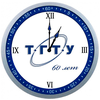
50. Voronezh State University

51. Siberian State Industrial University
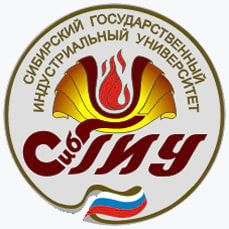
52. Saint Petersburg State Institute of Technology

53. Kalashnikov Izhevsk State Technical University

54. St. Petersburg State University of Architecture and Civil Engineering

55. Mendeleev University of Chemical Technology of Russia

56. Murmansk State Technical University
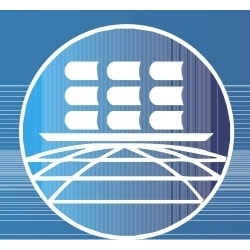
57. South-Western State University

58. Ogarev Mordovia State University

59. Tomsk State University of Control Systems and Radioelectronics
60. south-russian state university of economics and service.

61. Perm State University

62. Kuzbass State Technical University

63. Russian National Research Medical University

64. Plekhanov Russian University of Economics

65. Ulyanovsk State Technical University

66. Ulyanovsk State University

67. Penza State University
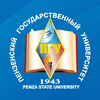
68. Kuban State University of Technology

69. Polzunov Altai State Technical University

70. Chelyabinsk State University

71. Yaroslavl State University

72. University of Tyumen

73. National Research University of Electronic Technology

74. Leningrad State University

75. Moscow State Pedagogical University

76. Udmurt State University

77. Irkutsk State University

78. North-Eastern Federal University

79. Bashkir State University

80. Russian Presidential Academy of National Economy and Public Administration

81. Kuban State University

82. Kuban State Agricultural University

83. St. Petersburg State University of Aerospace Instrumentation

84. Kemerovo State University

85. Immanuel Kant Baltic Federal University

86. Orenburg State University

87. Baltic State Technical University "Voenmeh"

88. Tomsk State University of Architecture and Building
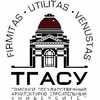
89. Chuvash State University
90. ivanovo state power university.

91. Irkutsk National Research Technical University

92. Orel State University

93. State University of Management

94. Tomsk State Pedagogical University
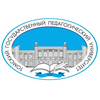
95. Volgograd State University

96. Petrozavodsk State University

97. Tver State University

98. Northern Arctic Federal University

99. Omsk State Transport University

100. Kaliningrad State Technical University

The best cities to study Mechanical Engineering in Russia based on the number of universities and their ranks are Moscow , Tomsk , Saint Petersburg , and Ufa .
Engineering subfields in Russia

IMAGES
VIDEO
COMMENTS
The Medical Physics Graduate Program is an interdisciplinary program sponsored by five departments: radiology, radiation oncology, physics, biomedical engineering, and occupational and environmental safety (health physics). Four academic tracks are offered: diagnostic imaging physics, radiation oncology physics, nuclear medicine physics, and ...
Medical physics is an applied branch of physics that applies physical energy to the diagnosis and treatment of disease. Professional medical physicists are involved in clinical service, consultation, research and teaching. At Purdue, the medical physics graduate program provides a strong foundation in radiological and applied physics training ...
The Biomedical Physics (BMP) Graduate Program is a PhD training program hosted by the Departments of Radiology and Radiation Oncology within the Stanford University School of Medicine. ... The first incoming class beginning in fall 2022 will take courses spanning traditional and emerging topics in medical physics and perform original research ...
The Medical Physics Graduate Programs are strong proponents of diversity, equity, and inclusion. We support students from diverse backgrounds because we believe that fostering an inclusive, multicultural environment benefits our students, our programs, and the field of medical physics at large.
PhD Program in Medical Physics The Committee on Medical Physics offers a program to provide aspiring medical physicists with the knowledge they will need in their future professions. Our program leads to the Doctor of Philosophy degree with an emphasis on research that provides preparation for careers in academia, industry, and/or clinical ...
HST's MEMP PhD Program Is this program a good fit for me? HST's Medical Engineering and Medical Physics (MEMP) PhD program offers a unique curriculum for engineers and scientists who want to impact patient care by developing innovations to prevent, diagnose, and treat disease. We're committed to welcoming applicants from a wide range of communities, backgrounds, and experiences.
The Medical Physics Team provides clinical physics and dosimetry services at the Moffitt Cancer Center clinics. It currently consists of 19 physicists (nine faculty), 18 dosimetrists, and two medical physics residents. Program faculty from MCC also includes non-physicists from various clinical and research departments.
A professional doctorate program, typically leading to a degree of Doctor of Medical Physics (DMP) consists of at least two years of didactic education followed by at least two years of clinical education. **Granted administrative extension of accreditation while under review for reaccreditation.
The Medical Physics Graduate Programs reserves the right to request an English proficiency test or interview from any applicant, may make enrollment in English language courses a condition for admission, and/or may subsequently require that an admitted student enroll in English language courses based on an assessment of the student's English ...
Brown's Graduate Program in Medical Physics combines a rigorous curriculum, superb clinical settings and a unique focus on research training to prepare students for professional success. Faculty and staff are engaged and motivated to equip students with the knowledge and professional competencies that will make them competitive for medical ...
The Medical Physics Graduate Program. Medical physics is a profession that combines principles of physics and engineering with those of biology and medicine to effect better diagnosis and treatment of human disease while ensuring the safety of the public, our patients and those caring for them.
Requirements. PhD: The MS degree is a requirement for admission into the PhD program in Medical Physics.Applicants not holding an MS in Medical Physics from a CAMPEP-accredited institution should apply to the MS program, regardless of whether the intended goal is a terminal MS degree or continuation to the PhD program.
The Mission of the Commission on Accreditation of Medical Physics Education Programs (CAMPEP) is to promote consistent quality education of medical physicists by evaluating and accrediting Graduate, Residency, Professional Doctorate in Medical Physics (DMP), Certificate, and Continuing Education programs that meet high standards established by CAMPEP in collaboration with its sponsoring ...
The Medical Physics Graduate Program is accredited by the Commission on Accreditation of Medical Physics Education Programs (CAMPEP) and offers MS and PhD degrees. The goal of the program is to prepare students for entering a clinical medical physics residency program in therapy or imaging physics and/or to pursue a career in research and ...
Medical Physics Track Under BMP PhD Program. Program Overview The Departments of Radiology and Radiation Oncology are proud to offer a new PhD program in Biomedical Physics (BMP). This program, supported by and integrating faculty from these two departments, was formally approved by the university in May 2021 and welcomed its first class of ...
Accredited degrees: M.S., Medical Physics Program Director:Christopher Kleefeld, Ph.D. 353 (0) 91-495383 / Fax: 353 (0) 91-494584 [email protected]. Oregon Health and Science University Medical Physics Graduate Program 2730 SW Moody Avenue Portland, OR 97201 Program Director: Thomas Griglock, Ph.D. [email protected]
The Medical Physics track is accredited by the Commission on Accreditation of Medical Physics Education Programs (CAMPEP), which recognizes that our training has met CAMPEP requirements. ... These faculty members do not accept graduate students. They participate in teaching, co-mentoring, exam and dissertation committees, and all other program ...
The Medical Physics Graduate Program offers MS degrees (with either a Thesis or Non-Thesis option) and PhD degrees in Medical Sciences with a concentration in Medical Physics. Candidates for all graduate degrees must be in good standing with the graduate school, having a GPA of 3.0/4.0 or greater, and have no "Incomplete" grades on their…
The Program consists of a core curriculum of medical and nuclear physics courses, a laboratory course, anatomy, two practicums, a tutorial, one elective, and a seminar. Specific course requirements are: APPH E4010: Introduction to nuclear science. APPH E4330: Radiobiology for medical physicists. APPH E4710: Radiation instrumentation lab, I.
Graduate Programs › Medical Physics, MS; Overview; Admission; Requirements; The program is designed for full-time students who wish to pursue a career as a medical physicist either as a researcher, as a certified clinical profession, or in industry. The program will require successful completion of a minimum of 38 credits for Master's ...
Physics in Medicine and Biology 2013;58:6337-6353. Giantsoudi D, Grassberger C, Craft D, Niemierko A, Trofimov A, Paganetti H. Linear energy transfer (LET)-Guided Optimization in intensity modulated proton therapy (IMPT): feasibility study and clinical potential.
UF Medical Physics is incredibly proud of the 2024 Richard L Morin, PhD, Fellowship in Medical Physics Awardees: Colin Schaeffer, PhD and Zahra Razi, PhD! Drs Schaeffer and Razi both graduated from the UF Medical Physics Graduate Program. Dr Schaeffer was awarded his MS in 2020, followed by his PhD in 2023. His dissertation was…
Germany. India. Italy. Japan. Netherlands. See the US News rankings for Engineering among the top universities in Russia. Compare the academic programs at the world's best universities.
Congratulations to Hadley DeBrosse (La Riviere Lab) who successfully defended her PhD on April 16, 2024. Hadley's thesis is titled: "Metal Mapping with X-Ray Fluorescence Emission Tomography". Hadley joined the University of Chicago in 2019, after graduating with a BS in Physics from the University of Dayton.
EduRank.org is an independent metric-based ranking of 14,131 universities from 183 countries. We utilize the world's largest scholarly papers database with 98,302,198 scientific publications and 2,149,512,106 citations to rank universities across 246 research topics.
Education programs of MIPT undergraduate, graduate and online schools, including price and financial aid information. International department ... Moscow Institute of Physics and Technology is a top ranked Russian national research university by subject THE #71 Physical Science THE #72 Computer Science ...